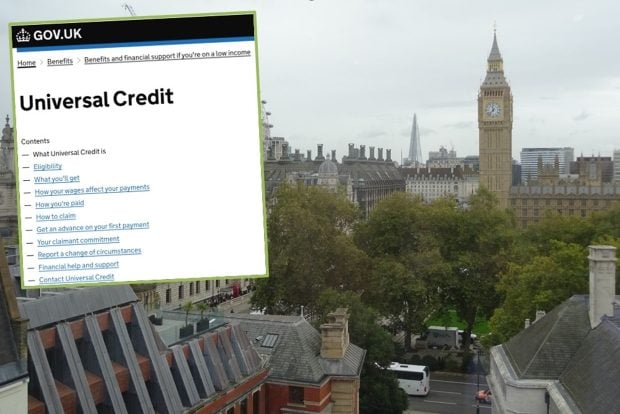DWP hunts ‘strategic supplier’ of open banking tech for Universal Credit

The UK Department for Work & Pensions (DWP) has instigated a search for a ‘strategic supplier’ of open banking technology for use on Universal Credit – a high-profile UK social security payment.
The department’s move is significant on numerous fronts and the latest show of faith from the UK public sector in the potential of financial technology for public policy delivery.
The country’s biggest public service department already dipped a toe into using open banking last year, engaging fintech company Ecospend to develop a ‘Universal Credit Open Banking Proof of Concept’.
It is now stepping up its engagement with the technology, launching a procurement process using the ‘Open Banking Dynamic Purchasing System (DPS)’ run by the Crown Commercial Service (CCS) to facilitate the use of open banking across the UK public sector.
It is a particularly sensitive time politically for the assignment, with the government having recently announced reforms to ‘rebalance the payment levels in Universal Credit, to promote work and address perverse incentives.’ It has acknowledged that many will lose out financially. There were 7.5 million people in England, Scotland on Wales receiving Universal Credit in January 2025 – the highest level it has been since its introduction in 2013, according to government data published in February.
OPEN BANKING EXPLAINED Open banking is being encouraged by governments worldwide as a means of boosting innovation and competition in financial services. ‘Open’ refers to open application programming interfaces (APIs): software intermediaries that allow two machines to interact (and, in the case of open banking, share banking data – with the dataholder’s permission). Global Government Fintech’s focus is on its potential to improve public service delivery.
DWP project to help verify bank accounts for a citizen
DWP’s tender notice has been shared with companies registered on CCS’s Dynamic Purchasing System on 6 May but is not publicly available.
CCS, which is an executive agency of the Cabinet Office, launched the DPS as 2024 dawned with the ultimate aim of ‘reducing the costs of receiving money into public sector organisations, as well as reducing fraud.’ At time of writing, 23 companies (all looking to supply open banking-related services to the public sector) are named on CCS’s open banking ‘appointed suppliers’ webpage.
DWP’s aim was originally to publish its invitation to tender in March or April, and to award a contract ‘in between June and July 2025’, according to a ‘prior information notice’ published on 20 February.
The prior information notice states that the DWP is looking for a company to ‘partner with UC’ (Universal Credit) to provide: ‘the ability for citizens to share bank balance and transaction details for all their bank accounts’; and ‘the ability to verify bank accounts for a citizen.’
‘The use cases […] are not exhaustive and DWP may wish to access additional open banking products based on future market developments,’ the prior information notice continued, adding that ‘the chosen supplier should therefore be open to future provision of these services, as DWP identifies further open banking opportunities.’
‘The chosen supplier must be able to partner with DWP to explore and exploit the growth of open banking functionality as the need, and use cases, arise,’ the notice added.
Read more: DWP trials open banking for benefits claimants – a news story (13 August 2024) on the department’s proof-of-concept
Account Information Services trial
The UK is widely seen as global leader when it comes to developing an open banking ecosystem in the private sector, spurred by the creation of its Open Banking Implementation Entity (OBIE) in 2016.
In the public sector HM Revenue & Customs (HMRC) created global government fintech history in March 2021 when it introduced a ‘Pay by bank account’ option (button) for people making online self-assessment tax returns – believed to be the first time any government worldwide had used open banking to facilitate tax payments. HMRC’s move was enabled using technology supplied by the same provider – Ecospend – engaged by DWP last year.
DWP’s toe-dip into open banking was focused on what are known as ‘Account Information Services – AIS’. HMRC’s use of open banking technology was initially focused on ‘Payment Initiation Services – PIS’ but expanded into AIS last year. Both AIS and PIS rely on application programming interfaces (APIs) – the tech connections that are crucial to open banking.
Activity during last year’s DWP open banking proof-of-concept was limited to a ‘population of UC claimants aligned to three job centres.’
‘Considering the demographics of UC claimants, it is expected that consent rates will be substantial,’ the contractual document stated. ‘To this effect, DWP will benefit from a robust dataset, offering valuable insights and lessons learned.’
The prior information notice for DWP’s new procurement described the UC process as requiring citizens “to register online and provide various details about their circumstances including information on their earnings, housing, money, savings and investments”; adding that “these are required to confirm eligibility to receive UC and calculate the amount to be paid.”
The notice also summarised the proof-of-concept activity, stating that “in October 2024, UC started a trial for open banking, providing citizens with a secure and simple online process to share bank balance and transaction data. This removes the need to provide paper statements in Job Centers or upload them to the UC service.”
Upcoming event: Do you work for a government department, public sector agency or authority looking to capitalise on the possibilities of technology to transform your operations and the services you deliver? REGISTER NOW to attend Global Government Fintech Lab 2025 in Dublin, Ireland, on 11 June
Public sector open banking use
The number of examples of different parts of the UK public sector exploring or actually using open banking has been growing steadily since HMRC took the plunge.
In 2023 savings bank state-owned savings bank NS&I (National Savings & Investments) hired a fintech company – again, Ecospend – to enable the use of open banking technology to enable people to make payments.
Global Government Fintech reported in August 2024 that the Driver and Vehicle Licensing Agency (DVLA) has also had internal discussions about the possibilities of using open banking technology. The DVLA collects tax from owners of vehicles driven or kept on public roads – a tax known as Vehicle Excise Duty (VED).
The following month (September 2024) the Government Digital Service (GDS) published a request-for-information (RFI) from payment service providers as it engages with suppliers about potentially procuring open banking technology. GDS was keen to ‘understand the market and service offerings for processing credit and debit card payments and pay by bank (open banking) payments’, according to a prior information notice for a payment provider for Gov.UK Pay. Gov.UK Pay is a digital payments platform used by more than 1,200 services in more than 400 organisations.
UK councils are also using open banking technology to make government payments to residents. For example, Coventry City Council is among numerous councils working with PayPoint – also one of the 23 companies on the CCS DPS.
Governments elsewhere in the world are also waking up to the potential use of open banking by public authorities. For example, in February New Zealand’s Inland Revenue issued a request-for-information (RFI) to potentially procure ‘open banking and related technologies’.
Read more: How can open banking be useful to governments (and the public sector)? – check out our short guide (most recently updated on 20 December 2024)






















